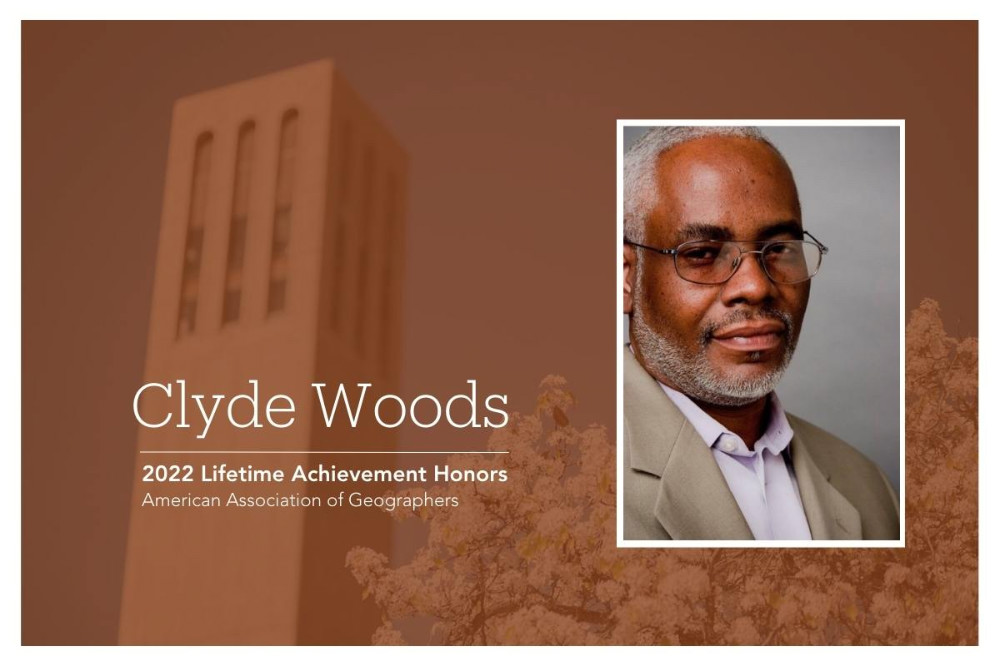
The Forever Scholar
The people who knew Clyde Woods — colleagues, students, family and friends — keep him close in their hearts. An associate professor of Black Studies at UC Santa Barbara, he imbued his scholarship with brilliance, passion and compassion.
In recognition of his groundbreaking work — which weaved together geography, Black Studies, environmental justice, urban and regional planning and more — the American Association of Geographers (AAG), has awarded him the inaugural, posthumous 2022 AAG Lifetime Achievement Honors.
“This posthumous recognition is testament to the spectacular contributions our colleague made to scholarship in geography and related fields,” said Jeffrey Stewart, MacArthur Foundation Chair and distinguished professor of Black Studies. “As is all too often, this recognition comes after this most deserving scholar has gone.”
Woods, who came to UCSB in 2005, died in 2011 at 54 after a battle with cancer.
While his Ph.D. from UCLA was in urban and regional planning, Woods’ reach and career defied conventional mapping, said Ingrid Banks, associate professor and chair of Black Studies at UCSB.
“Professor Woods engaged in public social science that was influenced by his training in geography, as well as his deep commitment to grounding his work in the intellectual and social justice mission of Black Studies,” she said. “His groundbreaking book, 'Development Arrested: Race, Power, and the Blues in the Mississippi Delta' (Verso) paints a wonderful tapestry of how the blues serves as a window into understanding the centuries-long social, political and economic plight of African American workers within the Mississippi Delta plantation/planter system.”
For all his scholarly achievements, Woods is remembered as a great mentor, a professor genuinely invested in the growth of his students. As his son Malik Woods, writing in “Black California Dreamin’: The Crises of California’s African-American Communities” (UCSB Center for Black Studies Research) said, “His success as a professor will be measured not in the number of students who passed through his classroom but in the number that went on to become teachers and professors themselves. … All of his students benefited from my father’s tutelage and sincere passion for learning.”
Banks, who was a co-editor of “Black California Dreamin’,” said Woods was deeply committed to mentoring students who were interested in doing social justice work.
“When he took students to New Orleans in the aftermath of Hurricane Katrina,” she said, “I remember students returning and sharing how the experience changed their lives. They noted how they were able to put into practice what they were learning in Clyde’s course. The students were grateful to Clyde and respected him as an activist-teacher.”
Outside the classroom Woods was a beloved friend. He and Banks often hiked in the mountains around Santa Barbara. He loved hearing and telling stories.
“We had that in common,” she said. “So we spent time exchanging stories about our youth and our adulthood. We spent a lot of time laughing — side-splitting laughter! And promised each other that the stories we told would stay on those trails.”
Eleven years after his passing Woods remains a formidable presence at the intersection of Black Studies, geography and social justice. The Black Geographies Specialty Group, which is affiliated with the American Association of Geographers, annually presents the Clyde Woods Black Geographies Graduate Student Paper Award to the best paper on a Black Geographies topic written by a master’s or Ph.D. student who is a BGSG member.
Woods’ lifetime achievement award is a reminder that he passed all too soon, and that he had so much more to offer.
“Clyde was really just hitting his stride,” Banks said. “I often think about the late soul/R&B singer Sam Cooke and, given his body of work when he died, how much more he could have enriched the lives of those who loved his work. I feel the same way about Clyde. Clyde had made a huge mark in his career, but he had so much left to give us.
“When Clyde passed away,” she continued, “a number of his colleagues decided to finish publications that were nearly done. When scholars pass, their work is not typically finished by their colleagues. But a number of us across the UC system and beyond did that for Clyde. It is a testament to who Clyde was and how much he meant to so many.”



